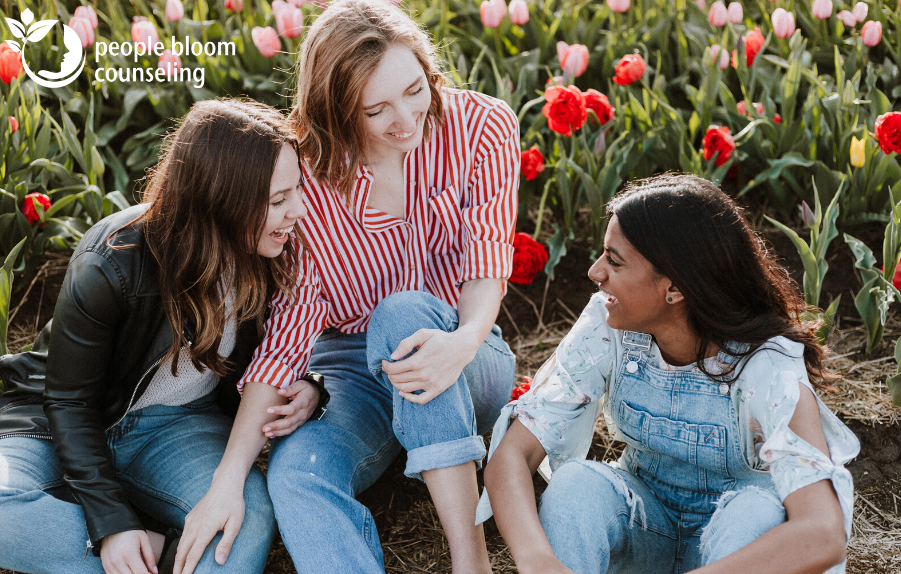Photo by Charles Deluvio on Unsplash
In my last post, I declared my fandom for Lizzo, briefly introduced Health at Every Size (HAES) and disputed the BMI myth.
Today, I want to tell you more about HAES and how it’s disrupting the way we see ourselves, for the better.
Why Diets Don’t Work
Can you think of anyone that has lost a significant amount of weight by intentional dieting, especially within a short period of time and not gained any of it back? It’s unlikely, because diets have a 95% fail rate.* Our bodies all have something called a “set weight point,” which is basically a happy place that our bodies naturally like to hang out in. It fluctuates either direction about ten pounds, dependent on a slew of factors including hormones, water, and bowel (yes that means poop). When we try to defy it with restrictive diets, our metabolism slows and our body does whatever it can to get us back to home base. That’s because our body is trying to keep us alive! Yo-yo dieting messes with our metabolism, hunger/fullness hormones, and in addition to weight gain, has worse long-term health outcomes than not dieting at all.
When it’s never enough
If you, like myself, have been a historic yoyo dieter… you’ve probably noticed that even in the times you do manage to “lose the weight,” you’re not completely satisfied. There’s always more to go - five more pounds, one more size down, one less pinch of extra skin on your hips. It’s never enough, even when it was supposed to be. Most of us really never have that “Hells yes, I’m done!” moment where everything in life seems in place once we lose the weight or fit into the pants. Even those in the thinnest bodies have insecurities, and would change things about themselves if they could. Then what does that tell us? It’s not about the weight. We’re looking for something else. It could be a sense of control… maybe acceptance. Perhaps some sort of “good enough-ness.” It’s okay to ask for help to begin to peel back these layers when we’re ready.
When food is food
What if we could create a culture where food is just food? We eat what makes our bodies feel good, in honor of what our bodies do for us, and not our clothing size. When we aren’t denying ourselves by numbers and caloric deficits, it’s amazing how food begins to lose its power; a power that humans ascribe to it. Down with the food rules. Instead, we should be listening to our bodies tell us what to put in it that makes us feel our best...and how we choose to move it, move it.
The importance of physical activity
Speaking of movin’ it, one of the best predictors of long-term health is regular activity. Rather than using exercise to compensate for consumed calories, reduce guilt, or as punishment, we should be finding ways to honor and appreciate our bodies through movement that we actually enjoy. Our bodies do a lot for us, and they deserve a little (or a lot of) appreciation. Not everyone has the privilege of mobility...but those of us who are able-bodied are able to jump, dance, walk, and play. And that should count for something. Ya don’t have to love your body all the time, or even like it. We just hope that you can despise it less and appreciate it more. And even though your body does cool stuff for you, it’s just the shell we call home for our short time in this life. There’s a whole self inside of you who holds your true worth, and your sense of self is not contingent on the shell you reside in.
How Health at Every Size is changing the game
The HAES movement is pushing for change. Instead of an obsession with losing weight, we want to lose the weight stigma, and educate the public on empirically supported indicators of health and well-being.
The Official Health At Every Size® Principles*:
1. Weight Inclusivity: Accept and respect the inherent diversity of body shapes and sizes and reject the idealizing or pathologizing of specific weights.
2. Health Enhancement: Support health policies that improve and equalize access to information and services, and personal practices that improve human well-being, including attention to individual physical, economic, social, spiritual, emotional, and other needs.
3. Respectful Care: Acknowledge our biases, and work to end weight discrimination, weight stigma, and weight bias. Provide information and services from an understanding that socio-economic status, race, gender, sexual orientation, age, and other identities impact weight stigma, and support environments that address these inequities.
4. Eating for Well-being: Promote flexible, individualized eating based on hunger, satiety, nutritional needs, and pleasure, rather than any externally regulated eating plan focused on weight control.
5. Life-Enhancing Movement: Support physical activities that allow people of all sizes, abilities, and interests to engage in enjoyable movement, to the degree that they choose.
But wait, there’s more!
The information above is just scratching the surface. There are A TON of fantastic resources available for HAES informed material and oh-so-much greatness to learn. I know it’s peak season for diet culture. So instead of Googling “best weight-loss plans for 2020”, I hope you do yourself the favor of leaning into the resources below:
https://www.sizediversityandhealth.org/index.asp
https://haescommunity.com/find/
Instagram: #haes
(This hashtag will connect you to various body positive/HAES informed accounts of professionals, advocates, and just regular bad-ass people)
*Data Borrowed from -
Body Respect: What Conventional Health Books Get Wrong, Leave Out, and Just Plain Fail to Understand about Weight by Lindo Bacon and Lucy Aphramor.
And https://www.sizediversityandhealth.org/content.asp?id=152
Lastly, if these resources aren’t enough and you need a professional to be with you on this journey of self-care, come see me. Let’s get you started on self-love.
Abby Erickson is a Licensed Mental Health Counselor at People Bloom Counseling, a Redmond psychotherapy practice. She helps people with anxiety and social anxiety learn ways to better manage their angst. She also helps people struggling with low self-esteem and body image issues be comfortable in their own skin. She longs to help create a world where women and men learn to love their bodies.







